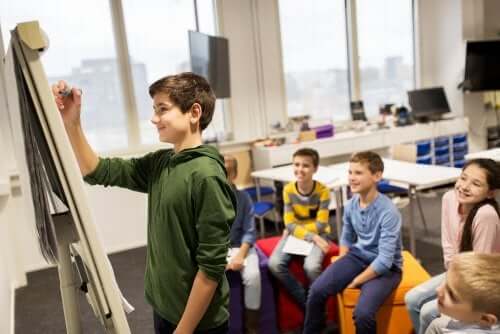Habits of Mind to Work On in the Classroom

As we’ve said, the habits of mind to work on in the classroom refer to certain skills that we need to learn in order to perform our tasks. They’re not only necessary for tasks we perform at school or in our jobs, but also in our everyday lives. Therefore, it’s important that teachers plan situations and teaching experiences in which children learn and practice these skills.
What are habits of mind?
A habit refers to a practice that becomes habitual in a person – like second nature. At the same time, this habit develops through gradual and systematic learning that allows a certain practice or way of doing an activity or task to become frequent.
In their book Learning and Leading With Habits of Mind (2008), Arthur L. Costa and Benna Kallick develop the idea of the habits of mind. And, at the same time, they indicate 16 habits or mental skills that are necessary in order to develop our life activities successfully.
Working on the habits of mind that the authors mention is fundamental in the educational context, that is, in the classroom. For one, because they’ll allow students to move more freely in all areas of their adult life. And, at the same time, because they’ll facilitate school learning, study tasks, social practices, and relationships.
What are the habits of mind to work on in the classroom?
As mentioned, Costa and Kallick describe 16 habits:
- Be persistent: Finishing the tasks you’ve started and doing them in a constant and concentrated way.
- Managing impulsivity: Being patient, thinking, and reflecting before acting or saying anything.
- Listening with understanding and empathy: Putting yourself in the other person’s shoes and listening carefully to understand them.

- Thinking flexibly: Changing your opinion; developing and evaluating different thought and action strategies according to situations and contexts.
- Thinking about thinking: Using the process of metacognition to know and reflect on how we think, in what way, and how it affects our decisions and other people.
- Seeking accuracy: Being thorough and tidy in our tasks.
- Asking questions and proposing problems: Interrogating about and questioning life situations.
- Applying past knowledge to new situations: Using old knowledge to better learn new and more complex knowledge.
- Thinking and communicating clearly and accurately: Knowing the correct ways to communicate, both in written and oral form and according to the context.
- Gathering information through all senses: Perceiving information in different ways to better understand knowledge.
- Creating, imagining and innovating: Generating new ideas; being creative and original.
- Responding with admiration and amazement to our environment: Being alert and finding what’s different in normal, common, everyday situations.
- Taking risks in a responsible way: Considering mistakes as an essential part of any decision making.
- Finding humor: Laughing, especially at oneself, to overcome frustrations and difficult life situations.
- Thinking independently: Being critical; having your own criteria and arguments.
- Remaining open to continuous learning: A willingness or constant need to learn new things.
How to work on the habits of mind in the classroom?
1. Being persistent
This is one of the habits of mind to develop through tasks or activities in which students invest their time in a planned way. That’s to say, students organize their time, distributing it over several days, in order to successfully complete an assigned task.
2. Managing impulsivity
In the classroom, an efficient way to work on this habit is to do activities around specific problems or dilemmas to which studies must provide a single response. Thus, this causes students to think and weigh all existing options before giving a solution to the problem.
3. Listening with understanding and empathy
Every everyday situation in the classroom is an opportunity to learn to empathize with others. It’s important for teachers to point out, emphasize, and demonstrate the need to listen and show interest in other people’s points of view. To understand and not judge other people’s circumstances.

4. Thinking flexibly
Any problematic situation or activity around dilemmas presented to students is useful for them to develop the habit of flexible thinking. This is because they must find possible solutions by always considering different factors.
5. Thinking about thinking
To think about thinking, teachers must work with their students on metacognition. That’s to say, they must enable students to talk, verbalize, and share with others how they’ve arrived at this or that solution or decision and why. In this way, students will be more aware of how they think and will therefore be able to reflect on it.
6. Searching for accuracy
To develop the habit of accuracy, it’s important within the classroom to insist on, for example, the constant correction and revision of writing, grammar and spelling. It’s also important to pay attention to the correct ways of speaking or addressing someone. In addition to insisting on formalities and details in the submission of work.
7. Asking questions and proposing problems
To develop this habit, you can choose to use a question book in the classroom. This would consist of students sharing with the rest of their classmates some concern, question, or problem that arises in any facet of school or daily life. At the end of each class, students can refer to their notes and discuss them together.
8. Applying past knowledge to new situations
The habit of using and transferring old knowledge to the understanding of new knowledge must always be brought into play in all learning processes. Hence the importance of teachers building on the previous knowledge that students have in order to teach others.
9. Thinking and communicating clearly and accurately
Developing this skill in the classroom takes place orally, teaching students to avoid generalizations in their speeches and insisting on fluency and specificity of language. In addition, it’s important to learn correct grammar and spelling in order to write accurately.
10. Gathering information through all the senses
To work on this habit in class, it’s important to plan school activities that use all the senses. Therefore, outdoor activities or activities in contact with nature are ideal.
11. Create, imagine and innovate
Teachers must make all possible resources available to their students so that they can develop their capacity to imagine, create and invent. Thus, new technologies are a powerful resource that allows for the creation of infinite forms of thought and action.

12. Responding with admiration and amazement before our environment
Teachers develop this habit of the mind by making students more aware of the nature that surrounds us; of its immensity and preciousness. To this end, school activities that focus on contact with the environment allow students to gain a better and deeper knowledge of the environment that surrounds them and, thus, to admire it.
13. Taking risks in a responsible way
Both teachers and students must be able to make room for mistakes in tasks and activities, for trial and error, and for working around challenges and problems. Considering mistakes as a substantial part of any learning process is the best way to develop the ability to take risks.
14. Finding humor
Finding moments within the school day to work on a sense of humor is critical. In this sense, a good way to work on the habit of humor in class could be to perform days of laughter therapy. Or make cartoons of the students to decorate the classroom and develop theater activities and comedies.
15. Thinking independently
It’s important to plan activities in which students can discuss a topic and can present their own views, arguments, and justifications. In this way, students will be aware of the diversity of opinions and positions that can exist. And, at the same time, of how important the contributions of others can be.
16. Remaining open to continuous learning
Teachers can develop this habit in class by proposing activities and experiences that really motivate their students to want to know more and demand searching thoughts from them. It’s also important that the educational experiences teachers propose to students appeal to their tastes, hobbies, or some detected need.
As we’ve said, the habits of mind to work on in the classroom refer to certain skills that we need to learn in order to perform our tasks. They’re not only necessary for tasks we perform at school or in our jobs, but also in our everyday lives. Therefore, it’s important that teachers plan situations and teaching experiences in which children learn and practice these skills.
What are habits of mind?
A habit refers to a practice that becomes habitual in a person – like second nature. At the same time, this habit develops through gradual and systematic learning that allows a certain practice or way of doing an activity or task to become frequent.
In their book Learning and Leading With Habits of Mind (2008), Arthur L. Costa and Benna Kallick develop the idea of the habits of mind. And, at the same time, they indicate 16 habits or mental skills that are necessary in order to develop our life activities successfully.
Working on the habits of mind that the authors mention is fundamental in the educational context, that is, in the classroom. For one, because they’ll allow students to move more freely in all areas of their adult life. And, at the same time, because they’ll facilitate school learning, study tasks, social practices, and relationships.
What are the habits of mind to work on in the classroom?
As mentioned, Costa and Kallick describe 16 habits:
- Be persistent: Finishing the tasks you’ve started and doing them in a constant and concentrated way.
- Managing impulsivity: Being patient, thinking, and reflecting before acting or saying anything.
- Listening with understanding and empathy: Putting yourself in the other person’s shoes and listening carefully to understand them.

- Thinking flexibly: Changing your opinion; developing and evaluating different thought and action strategies according to situations and contexts.
- Thinking about thinking: Using the process of metacognition to know and reflect on how we think, in what way, and how it affects our decisions and other people.
- Seeking accuracy: Being thorough and tidy in our tasks.
- Asking questions and proposing problems: Interrogating about and questioning life situations.
- Applying past knowledge to new situations: Using old knowledge to better learn new and more complex knowledge.
- Thinking and communicating clearly and accurately: Knowing the correct ways to communicate, both in written and oral form and according to the context.
- Gathering information through all senses: Perceiving information in different ways to better understand knowledge.
- Creating, imagining and innovating: Generating new ideas; being creative and original.
- Responding with admiration and amazement to our environment: Being alert and finding what’s different in normal, common, everyday situations.
- Taking risks in a responsible way: Considering mistakes as an essential part of any decision making.
- Finding humor: Laughing, especially at oneself, to overcome frustrations and difficult life situations.
- Thinking independently: Being critical; having your own criteria and arguments.
- Remaining open to continuous learning: A willingness or constant need to learn new things.
How to work on the habits of mind in the classroom?
1. Being persistent
This is one of the habits of mind to develop through tasks or activities in which students invest their time in a planned way. That’s to say, students organize their time, distributing it over several days, in order to successfully complete an assigned task.
2. Managing impulsivity
In the classroom, an efficient way to work on this habit is to do activities around specific problems or dilemmas to which studies must provide a single response. Thus, this causes students to think and weigh all existing options before giving a solution to the problem.
3. Listening with understanding and empathy
Every everyday situation in the classroom is an opportunity to learn to empathize with others. It’s important for teachers to point out, emphasize, and demonstrate the need to listen and show interest in other people’s points of view. To understand and not judge other people’s circumstances.

4. Thinking flexibly
Any problematic situation or activity around dilemmas presented to students is useful for them to develop the habit of flexible thinking. This is because they must find possible solutions by always considering different factors.
5. Thinking about thinking
To think about thinking, teachers must work with their students on metacognition. That’s to say, they must enable students to talk, verbalize, and share with others how they’ve arrived at this or that solution or decision and why. In this way, students will be more aware of how they think and will therefore be able to reflect on it.
6. Searching for accuracy
To develop the habit of accuracy, it’s important within the classroom to insist on, for example, the constant correction and revision of writing, grammar and spelling. It’s also important to pay attention to the correct ways of speaking or addressing someone. In addition to insisting on formalities and details in the submission of work.
7. Asking questions and proposing problems
To develop this habit, you can choose to use a question book in the classroom. This would consist of students sharing with the rest of their classmates some concern, question, or problem that arises in any facet of school or daily life. At the end of each class, students can refer to their notes and discuss them together.
8. Applying past knowledge to new situations
The habit of using and transferring old knowledge to the understanding of new knowledge must always be brought into play in all learning processes. Hence the importance of teachers building on the previous knowledge that students have in order to teach others.
9. Thinking and communicating clearly and accurately
Developing this skill in the classroom takes place orally, teaching students to avoid generalizations in their speeches and insisting on fluency and specificity of language. In addition, it’s important to learn correct grammar and spelling in order to write accurately.
10. Gathering information through all the senses
To work on this habit in class, it’s important to plan school activities that use all the senses. Therefore, outdoor activities or activities in contact with nature are ideal.
11. Create, imagine and innovate
Teachers must make all possible resources available to their students so that they can develop their capacity to imagine, create and invent. Thus, new technologies are a powerful resource that allows for the creation of infinite forms of thought and action.

12. Responding with admiration and amazement before our environment
Teachers develop this habit of the mind by making students more aware of the nature that surrounds us; of its immensity and preciousness. To this end, school activities that focus on contact with the environment allow students to gain a better and deeper knowledge of the environment that surrounds them and, thus, to admire it.
13. Taking risks in a responsible way
Both teachers and students must be able to make room for mistakes in tasks and activities, for trial and error, and for working around challenges and problems. Considering mistakes as a substantial part of any learning process is the best way to develop the ability to take risks.
14. Finding humor
Finding moments within the school day to work on a sense of humor is critical. In this sense, a good way to work on the habit of humor in class could be to perform days of laughter therapy. Or make cartoons of the students to decorate the classroom and develop theater activities and comedies.
15. Thinking independently
It’s important to plan activities in which students can discuss a topic and can present their own views, arguments, and justifications. In this way, students will be aware of the diversity of opinions and positions that can exist. And, at the same time, of how important the contributions of others can be.
16. Remaining open to continuous learning
Teachers can develop this habit in class by proposing activities and experiences that really motivate their students to want to know more and demand searching thoughts from them. It’s also important that the educational experiences teachers propose to students appeal to their tastes, hobbies, or some detected need.
All cited sources were thoroughly reviewed by our team to ensure their quality, reliability, currency, and validity. The bibliography of this article was considered reliable and of academic or scientific accuracy.
- Ponce Meza, M. (2002). Reseña de”Los hábitos de la mente” de Costa, L. A. y Kallick, B. Revista del Centro de Investigación. Universidad La Salle. Distrito Federal, México, vol. 5, pp. 103-105. Recuperado de https://www.redalyc.org/pdf/342/34251811.pdf
- Costa, L. A. y Kallick, B. (2008). Learning and Leading with Habits of Mind: 16 Essential Characteristics for Success. Editor Asnn for Supervision y Curricu.
- Costa, L. A. y Kallick B. (2008). Hábitos de la Mente. Capítulo I: Cambio de Perspectivas Sobre la Inteligencia. Recuperado de http://mestreacasa.gva.es/c/document_library/get_file?folderId=500002872930&name=DLFE-256054.pdf
This text is provided for informational purposes only and does not replace consultation with a professional. If in doubt, consult your specialist.








